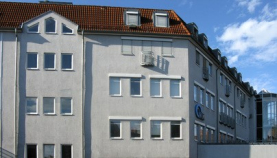
The IGPP is a German parapsychology organization based in Freiburg that carries out experimental psi research and offers educational and counselling services.
Overview
The Institute for Frontier Areas of Psychology and Mental Health (IGPP) is a parapsychology organisation based in Freiburg, Germany (Institut für Grenzgebiete der Psychologie und Psychohygiene). It was founded in 1950 by physician and psychologist Hans Bender. Its research interests are altered states of consciousness, extraordinary human experiences, and mind-matter interactions, with experiments into psi effects such as the presentiment response and remote influence, along with conventional psychological processes such as false memory syndrome and time perception.
The IGPP also offers services in counselling, information, and education programs tailored for individuals who report extraordinary experiences.
Full details of the IGPPs early history are given in a 1987 article by Eberhard Bauer.1 A 2012 book chapter by Bauer offers an overview of its counselling activities.2
The IGPP's website is here.
Experimental Research
Examples of the IGPP’s experimental research follow.
Precognition
In the Necker cube optical illusion, a wired outline of a cube is resolved into one of two perspectives. Exposure to one perspective heavily influences in what direction the illusion is resolved if the illusion is presented shortly afterward – termed perceptual history influences.3 IGPP researchers carried out two experiments to test whether this influence could apply retroactively – a form of precognition. Compelling individual precognitive patterns were found in two participants but none at the group level.4
IGPP research co-ordinator Marc Wittmann and colleagues attempted a replication of a ‘retropriming’ effect claimed in 2011 experiments by Daryl Bem.5 Here, an image presented to a person is more quickly assessed as being either positive or negative in nature if the words presented afterwards are congruent with the image (negative image–negative word, or positive image–positive word) than incongruent. Neither of two studies confirmed the effect at group level, although a post-hoc exploration of the first found a significant positive effect among males (p = 0.017), replicating gender effects found in other precognition studies.6 In the second study overall reaction times were found to be slower for congruent photo-word pairs than incongruent pairs, and this was statistically significant (p = 0.022).7
In a test of backward priming that used EEG readings, the effect was not found at group level, although two participants showed significant effects. Exploratory analyses found significant differences between congruent and incongruent primes (p = 0.0012) located mainly around the supramarginal gyrus, a part of the brain involved in word processing. Training artificial neural networks (ANN) on 80 percent of the EEG data, in order to find psi effects in the confirmatory 20 percent, resulted in chance findings only.8
Remote Viewing
In a remote viewing study conducted by IGPP researchers Marc Wittmann and Maximilian Muller, 36 subjects were asked to describe one of six photographs in a sealed envelope. Fourteen made direct hits, which is highly significant (p < 0.0009).9
In a second study published in 2019, Wittmann, together with husband-and-wife team Maximilian and Laura Müller, ran 48 binary associative remote viewing (ARV) trials in which the future direction (up or down) of the German stock market is used as the target. Chance would predict 24 (50%) correct predictions but overall scoring produced 38, a highly significant 79% hit rate (p = 2.3 x 10-5).10
In a third study published in 2021, Wittmann and Maximilian Müller tested remote viewing ability under two conditions: clairvoyance of binary targets in the present moment and precognition of targets that are determined randomly in the future. Using independent judging of viewers’ reports, present moment remote viewing produced highly significant scoring (p < 0.001). Precognitive remote viewing was less successful but still significant (p = 0.027), the difference between the conditions being significant (p = 0.003). Contrary to previous research, this finding points towards a temporal dependency of psi scoring. Wittmann and Müller discuss these and other such findings in terms of a probabilistic understanding of the future.11
Michael Duggan
Literature
Bauer, E. & von Lucadou, W. (1987). Parapsychologie in Freiburg - Versuch einer Bestandsaufnahme. Zeitschrift für Parapsychologie und Grenzgebiete der Psychologie 29/4, 241-82.
Bauer, E., Belz, M., Fach, W., Fangmeier, R., Schupp-Ihle, C. & Wiedemer, A. (2012). Counselling at the IGPP - an overview. In Perspectives of Clinical Parapsychology. An introductory reader, ed. by W.H. Kramer, E. Bauer & G.H. Hövelmann, 149-67. Bunnik: Stichting Het Johan Borgman Fonds.
Brascamp J, Sterzer P, Blake R, Knapen T. Multistable Perception and the Role of the Frontoparietal Cortex in Perceptual Inference. Annu Rev Psychol. 2018;69: 77–103. pmid:28854000
Friston, K. (2012). Prediction, perception and agency. International Journal of Psychophysiology 83, 248-52. pmid:22178504
Kornmeier, J., Bhatia, K., Joos, E. (2021).Top-down resolution of visual ambiguity – knowledge from the future or footprints from the past? PLOS ONE 16(10): e0258667.
Mozhdehfarahbakhsh, A., Wilson, M., Kornmeier , J., Wittmann, M. (2024). Eeg and behavioral correlates of forward and backward priming. Bial Foundation 14th symposium interim report. Grant 27/22.
Müller, M., Wittmann, M. (2017). Remote Viewing: Eine Proof-of-Principle-Studie. Zeitschrift für Anomalistik 17, 83-104.
Müller, M., Müller, L., Wittmann, M. (2019). Predicting the stock market: An associative remote viewing study. Zeitschrift für Anomalistik 19, 326-46.
Müller, M., Wittmann, M. (2021). Anomalous Cognition in the context of time: Does the viewer describe a deterministic or a probabilistic future? Journal of Scientific Exploration 35, 542-69.
Wilson M, Wittmann M, Kornmeier J. (2024). Behavioural and EEG correlates of forward and backward priming. PsyArXiv;. Available from: osf.io/preprints/psyarxiv/43zae.
Wittmann, M., Neumaier, L., Evrard, R., Weibel, A., Schmied-Knittel, I. (2017). Subjective time distortion during near-death experiences: an analysis of reports. Zeitschrift für Anomalistik 17, 309-20.
Wittmann, M., Hurd, P. (2018). Altered States of Consciousness: Experiences Out of Time. MIT Press. Cambridge, Massachusetts.
Wittmann, M., Scheck, F., Feldmann, J., Glaesman, A.,
Mossbridge, J., Bem, D. (2021). The German version of a retroactive priming task shows mixed effects. Psychology of Consciousness: Theory, Research, and Practice.

